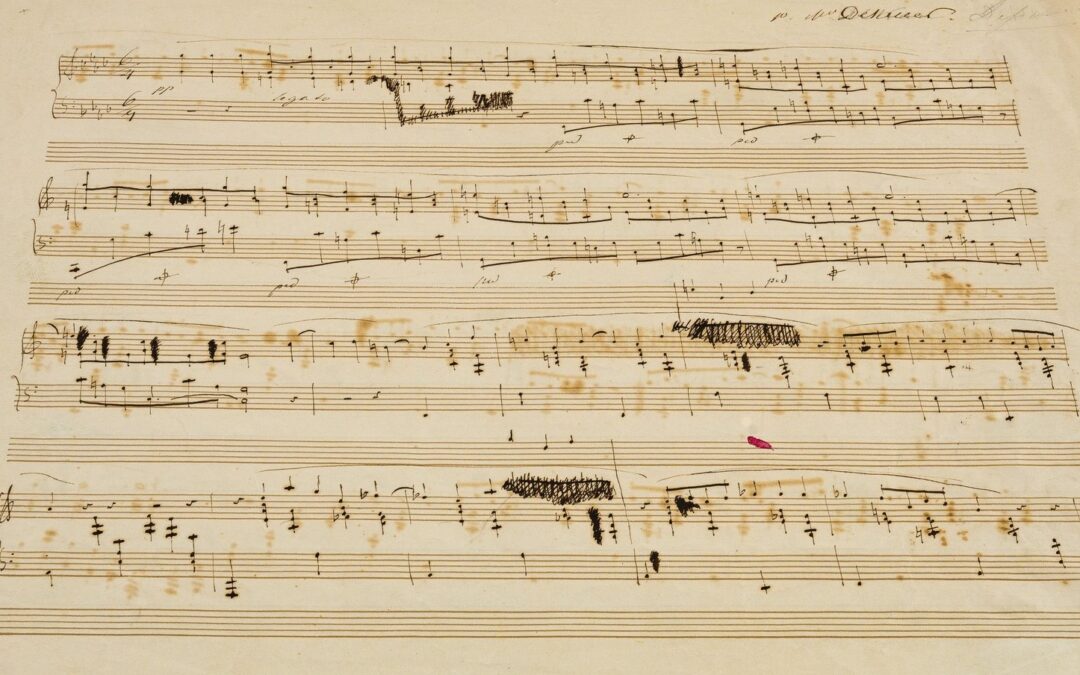Keep our news free from ads and paywalls by making a donation to support our work!

Notes from Poland is run by a small editorial team and is published by an independent, non-profit foundation that is funded through donations from our readers. We cannot do what we do without your support.
A rare manuscript of “Ballade No.4 in F minor, Op. 52” by renowned Polish composer Frédéric Chopin has been added to the collection of the Fryderyk Chopin Museum in Warsaw.
Its rarity derives from it being an autograph – a music manuscript written in its composer’s hand. It is one of only two known existing autographs of the composition. One of those is kept in the Bodleian Library in Oxford, while the other for years remained in private hands.
The museum has purchased the latter, which it is now displaying to visitors for a limited period of time.
Do naszej kolekcji narodowej zyskaliśmy bezcenny rękopis Ballady f-moll op. 52 Fryderyka Chopina. Przez dekady autograf tej ballady był niedostępny dla badaczy. Znany jedynie z czarno-białych fotografii z lat 50. XX wieku.
Cieszę się, że teraz, po miesiącach starań, trafia do… pic.twitter.com/Ww4MTA6xnM
— Hanna Wróblewska od kultury (@WroblewskaHann) January 24, 2025
“The autograph is a particularly important part of the Chopin legacy and one of the most valuable musical autographs of the composer in the collection of the Fryderyk Chopin Museum,” the institution told the Polish Press Agency (PAP).
Created in 1842, the work is widely regarded as the pinnacle achievement within the ballade genre and as Chopin’s most artistically ambitious and polished composition, according to the museum.
The manuscript remained with Chopin until his death in 1849. The composer’s sister then gifted it to Josef Dessauer, a Czech composer and a friend of Chopin.
It then resurfaced in 1933 in an antique shop in Lucerne, before being purchased by Rudolf F. Kallir, a noted antiquarian specialising in musical manuscripts.
Kallir did not usually share his collection with researchers. He made an exception and shared a black-and-white scan of the “Ballade in F minor” with the Fryderyk Chopin Society in Warsaw in the 1950s.
After Kallir’s death in 1987, the manuscript came into the possession of his heirs, from whom the Fryderyk Chopin Museum bought it in December 2024. The cost of the purchase will not be disclosed to the public.
The manuscript covers bars 1-79 of the composition and is in the form of a bifolium – a card folded in half that results in four pages.
“The last page, completely filled, may suggest that the source is incomplete and that the rest of the composition (bars 80-239) was noted on subsequent pages, now lost,” Marcin Wąsowski, head of the museum’s research department, told PAP.
A previously unknown waltz by Chopin has been found by chance at a library in New York.
It is the first time in almost a century that a new work by the renowned Polish composer, who died in 1849, has been discovered https://t.co/zIYXXlG7Nr
— Notes from Poland 🇵🇱 (@notesfrompoland) October 31, 2024
By analysing the details of the manuscript, researchers can gain insight into Chopin’s creative process. “The corrections, deletions and elaborations of fragments of musical notation found there show how the composer developed his ideas, changing and improving them,” said Wąsowski.
The manuscript is on public display at the Fryderyk Chopin Museum from 23-26 January. After that, it will be kept in a vault before returning for a temporary exhibition at the museum in June, organised in cooperation with the Museum of Romantic Life in Paris.
The other known existing autograph of the ballade is currently held in the Bodleian Library in Oxford. It contains a notation of bars 1-136 and served as the basis for the first German edition of the composition.
In October 2024, a previously unknown waltz by Chopin was found by chance at a library in New York. It marked the first time in almost a century that a new work by the composer had been discovered.

Notes from Poland is run by a small editorial team and published by an independent, non-profit foundation that is funded through donations from our readers. We cannot do what we do without your support.
Main image credit: W. Kielichowski / NIFC

Agata Pyka is a former assistant editor at Notes from Poland. She specialises in Central and Eastern European affairs, cybersecurity, and investigative reporting. She holds a master’s degree in political communication from the University of Amsterdam, and her work has appeared in Euractiv, the Balkan Investigative Reporting Network (BIRN), and The European Correspondent, among others.



















